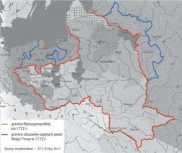3071579755
Zofia Zielińska
The Partitions of Poland

mieli spokrewnieni z wieloma domami panującymi Wettyni. Ów brak zagranicznego oparcia gwarantował wyłączną i trwałą zależność przyszłego króla jedynie od Rosji. Katarzyna wybrała na kandydata Stanisława Poniatowskiego, swego byłego kochanka z lat 1755-1758, należącego do „Familii”. Sądziła, iż Poniatowski będzie jej „wdzięczny”, to znaczy w pełni posłuszny, uważała nadto, że także jego wujowie Czartoryscy w zamian za koronę dla siostrzeńca zrealizują wszystkie żądania Rosji. Choć wiedziała, iż „Familia” planowała gruntowną reformę kraju z obaleniem liberum veta na czele, nie zdradzała się ze swą intencją zachowania tego instrumentu anarchii, by przed czasem Czartoryskich nie zrażać. Była pewna, że potem zmusi ich do rezygnacji z reformatorskich aspiracji.
Te iluzje załamały się już na sejmie koronacyjnym Stanisława Augusta, w grudniu 1764 r. Spośród wielu rosyjskich żądań król i Czartoryscy nic zrealizowali tylko jednego - poprawienia losu dysydentów, których Katarzyna uczyniła się protektorką. Przywódcy „Familii" bali się w tym wypadku narazić narodowi, zdecydowanie przeciwnemu żądaniom zarówno pełnej tolerancji, jak praw politycznych dla niekatolików. Na sejmach 1764 r. nowy król odsłonił nadto swe gorące pragnienie reform, które nad Newą wywołało niepokój, mimo że Stanisław August uległ Petersburgowi i na razie z obalenia liberum veto zrezygnował. Za pomocą sprawy dysydenckiej Katarzyna chciała nauczyć młodego monarchę bezwzględnego posłuszeństwa wobec swych rozkazów. Stanisław August był z przekonania zwolennikiem tolerancji i zapewniał imperatorową, że stopniowo spełni jej żądania na rzecz innowierców; Katarzyna nie chciała jednak czekać. Nie słuchała being abandoned the attemprs to abolish the liberum veto. By using the non-Carholic issue, Catherine wanted to teach the young monarch a lesson in total obedience to her orders. Sta-nislaus Augustus himself was a convinced supporter of toler-ance, and he repeatedly assured the empress that he would grad-ually fulhl all her wishes regarding the non-Catholics; but Catherine would not wait. She would not listen, either, to the advice of her ambassador in Warsaw, Nikolay Repnin, who ar-gued against the showdown of power, vouchsafcd for the king’s goodwill and was ready to cooperate with him in slowly work-ing out a settlement of the religious question that would even-tually satisfy both sides.
In the lace of the opposition of the king and the Czarto-ryskis to the idea of the immediate resolution of the non-Cath-olic ąuestion, from 1766 onward Catherine no longer advo-cated just tolerance, but in facr urged granting fuli equality of political rights to people of non-Catholic denominations, to an extent unknown in Europę at the time. The empress, disap-pointed with the “Family” and King Stanislaus Augustus (whom, having taught a lesson, she was nevertheless determined to re-tain on the thione), she perccived the non-Catholics as an obe-dient tool of Russian interference in Poland. She began to cooperate with the Potocki faction, then newly-returned to political life, in whom she wanted to have a counterbalance to the political power of the king and the “Family”. With their help, and the threatening force of over 30 thousand Russian troops who entered the Commonweafth territory in 1767, in the period of 1767-1768 the empress forced Poland to accept a governmental guarantec - from then on without Russia’s per-mission Poland was unable to introduce any reform - and the political parity of non-Catholics. This change was indeed achieved by force; for instancc during the session of the Seym, a fow troublesome parliamentarians and bishops opposed to the Russian ideas were abducted from Warsaw and deported to Rus-sia for five years. But Poland was only superficially pacified by these methods, as was proved by the great popular movement, the Bar Confederacy, which directly resulted in the outbieak of the Russo-Turkish war (the “Polish War” - 1768-1774). In the early 1770s this finally led to the emergence of conditions which resulted in the partition.
The king of Prussia, Frederick II, greeted the ourbreak of the war in the East in October 1768 with ezpectant pleasure. Rus-sias predicament indicated that it might be morę amenable to the proposal of sharing its Polish protectorate. Moreover, the treaty of alliance of 1764 obliged Prussia to pay considerable
Wyszukiwarka
Podobne podstrony:
KWARTALNIKPOLONICUM Zofia ZielińskaThe Partitions of Poland MarccUa Bacciarcllcgó (*1793). Olej na
KWARTALNIKPOLONICUM Zofia ZielińskaThe Partitions of Poland antyrosyjską demonstrację wojenną na
Rozbiory Polski Dorpat Q l^yneburg Troki,- To] °Matbork Lidzbarl Drahim Mińskę The Partitions of Pol
Rozbiór III Dorpat Q l^yneburg Troki,- To] °Matbork Lidzbarl Drahim Mińskę The Partitions of Poland
Rozbiory Polski Dorpat Q l^yneburg Troki,- To] °Matbork Lidzbarl Drahim Mińskę The Partitions of Pol
Rozbiory Polski Dorpat Q l^yneburg Troki,- To] °Matbork Lidzbarl Drahim Mińskę The Partitions of Pol
KWARTALNIKPOLONICUM Zofia ZielińskaRozbiory Polski Wykład o genezie rozbiorów Rzeczypospolitej
KWARTALNIKPOLONICUM Zofia ZielińskaRozbiory Polski szeń w Rzeczypospolitej, w stosunku do Rosji
KWARTALNIKPOLONICUM Zofia ZielińskaRozbiory Polski w tym także swego ambasadora Nikołaja Repnina, kt
KWARTALNIKPOLONICUM Zofia ZielińskaRozbiory Polski wtedy, gdy o nim decydowano, nikt w Petersburgu n
II rozbiór RP KfccrkJIIIL %P%kov Tv#co > SkKks *twg f / Zytom*f7Republic of Poland After Second P
ZOFIA KACZOROWSKA PRECIPITATION IN POLAND IN LONG-PERIOD AVERAGES Summary In the first part of this
Wojciech Kaute Michał llohrzynskPs synlhcsis of Ihc bisiory of Poland Sumniary M. Dobrzyński *s synl
potwierdzenie zgodności obiektu portowego I RZECZPOSPOLITA POLSKA REPUBLIC OF POLAND
CONTENTS L. Starkel: Progress in research on the evolution of the geographical environment of Poland
41671 potwierdzenie zgodności obiektu portowego I RZECZPOSPOLITA POLSKA REPUBLIC OF POLAND
George Sanford Historical Dictionary of Poland (2003) OF POLAND Sśtotuf F4UU-* GLOSLGE SANI ORD
więcej podobnych podstron